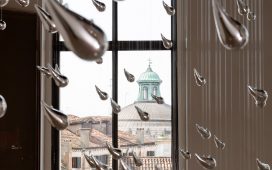The Chinese artist and dissident Ai Weiwei is swapping his adopted home of Berlin for Britain, saying German society has become intolerant of refugees and that he feels like a man without a home.
The artist is to move to Cambridge with his partner and 10-year-old son, but will keep a studio in the German capital.
Accusing Europe of turning its back on refugees and kowtowing to China for economic gain, the artist said: “Europe was a civilised, modern society which was supposed to uphold humanism, democracy, freedom and human rights. Europe may no longer remain Europe beyond geography.”
Germany took in more than a million refugees after a crisis that peaked in 2015 as war and poverty prompted a mass exodus from the Middle East and beyond. Populist politicians have since gained prominence by taking an anti-immigrant line.
“Europeans should not have the privilege to feel any moral superiority,” Ai said. “Asking for gratitude from the most desperately struggling, those afflicted by violence and poverty, makes me sick.”
Ai has long campaigned for refugees and migrants and has taken up their plight in much of his art work. He said the rise of populism had left him feeling sidelined in Germany, a country he moved to 2015.
“Most of the unfortunate and chaotic situations were either created by social injustice resulting from colonial history, or unfair exploitation due to globalisation and rampant capitalism,” he said.
He does not, however, expect to find perfect conditions in Britain. The country was “mired in a swamp” over its 2016 decision to leave the EU and turn inward. “The UK has a deep problem. They seem to have lost courage and vision in this fast-changing world,” he said.
The artist, who has long been critical of China, also chided Britain for failing the protesters out in force in Hong Kong, a former colony.
Ai said he initially chose Germany after leaving China because it had worked so hard for his freedom, but now felt the country had changed and that he was once again an exile. “Today, due to the political conditions in China, I have again been forced out,” he said.
Germany spent a record €23bn (£21bn) in 2018 on integrating refugees and addressing the causes of migration abroad, according to the government.
Germany defended its integration policy, saying it offered assistance, language skills and employment to incomers. “The integration of migrants into Germany’s society is a topic of great political importance for for Germany,” an interior ministry spokesman said.








